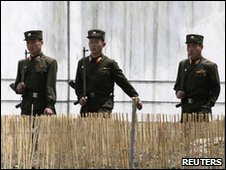 North Korea is to cut all relations with South Korea, Pyongyang's official news agency reports.
North Korea is to cut all relations with South Korea, Pyongyang's official news agency reports.Tuesday's KCNA reports announcing the severing of all ties - including communications - said the North was also banning South Korean ships and planes from its territorial waters and airspace.
Within a matter of days, relations between the two Koreas have returned to the freezer, says the BBC's diplomatic correspondent, Jonathan Marcus.
The diplomatic goal now will be to ensure that a renewed cold war on the Korean peninsula does not generate into a hot conflict, he adds.
The US, which has thousands of troops based in South Korea, has backed Seoul, condemning the incident and confirming late on Monday that it will hold joint anti-submarine naval exercises with the country.
US Secretary of State Hillary Clinton has said Washington and Beijing must work together to "fashion an effective response" to the sinking of the Cheonan.
Speaking in Beijing, Mrs Clinton said maintaining peace on the Korean peninsula was "a shared responsibility" between the countries.
China has called for all sides to show restraint, adding its voice to calls for international co-operation over the incident.
Vice Foreign Minister Cui Tiankai said Beijing was "ready to work together with the US and other parties and continue to stay in close touch on the situation on the Korean peninsula".
Analysts say China's attitude is key, because it holds a veto in the Security Council and has in the past been reluctant to impose tough measures on Pyongyang.
Provocation
Amid the rising tensions, South Korea has said it will drop propaganda leaflets into the North to tell people about the Cheonan incident, as well as setting up giant electronic billboards to flash messages.
Pyongyang has meanwhile accused South Korea of trespassing in its waters.
It said Seoul had sent "dozens of warships" into its waters since 14 May in "a deliberate provocation aimed to spark off another military conflict", KCNA reported.
"Should the South side's intrusions into the territorial waters of our side continue, the [North] will put into force practical military measures to defend its waters," it said.
On Tuesday Wu Dawei, China's special representative for Korean affairs, arrived in Seoul for talks with Foreign Minister Yu Myung-hwan.
Mrs Clinton is also due in Seoul for talks on Wednesday.



